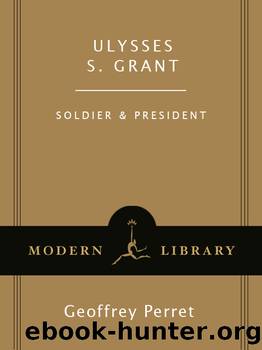Ulysses S. Grant by Geoffrey Perret

Author:Geoffrey Perret [Perret, Geoffrey]
Language: eng
Format: epub
ISBN: 978-0-307-56088-9
Publisher: Random House Publishing Group
Published: 2012-06-06T00:00:00+00:00
CHAPTER 21
âGET ALL THE SUNSHINE I CANâ
There had been only one lieutenant general in the history of the Republic, and that was George Washington. True, Winfield Scott had held three-star rank, but that was by brevet, meaning it was temporary and without any increase in pay. Following Grantâs stunning success at Chattanooga his congressional mentor, Elihu B. Washburne, introduced a bill to revive the grade of lieutenant general so that Grant could be raised to three stars.
Grant himself was of two minds about this move. He wrote to Washburne, urging him to ârecollect that I have been highly honored already by the government and do not ask, or feel that I deserve, any thing more in the shape of honors or promotion.â1 Grant had no objection to a promotion and the extra pay it was likely to bring. What had him worried was the possibility that three stars meant being chained to Halleckâs desk in the War Department. As Halleck himself had found, his job was as much a political appointment as a military one. Besides running the Army, his energies went into fending off politicians seeking favors from the War Department, dealing with the irascible and self-righteous Stanton, and implementing the Presidentâs policy of rewarding political allies with major commands.2
Washburne nevertheless pushed his bill with an enthusiasm that indicated he hadnât grasped the point, so Grant got Rawlins to follow up with a letter that left the congressman in no doubt: âI can only say that if the confering [sic] of the distinguished honor on him would mean taking him out of the field, or with a view to the superceding of General Halleck, he would not desire it, for he feels that if he can be of service to the Government in any place it is in Command of the Army in the field, and that is where he would remain if made a Lieut. General.â All of which amounted to saying that Grant would gladly take the three stars, provided he retained the drama and Halleck held on to the desk.3
While Washburneâs bill was making its way through Congress, Grant was trying, and failing, to cash in on victory at Chattanooga. There had been virtually no pursuit of Braggâs defeated army. The only divisions in position to mount a pursuit were the four that stormed Missionary Ridge, and only one division commanderâPhil Sheridanâshowed the alertness and aggressiveness to pursue the enemy. The other three had sat down on Missionary Ridge and neither their corps commander nor George Thomas, their army commander, was inclined to make them move out. The aftermath of Chattanooga was that Grantâs admiration for Sheridan went through the roof, while his already shaky faith in Thomas took another knock.4
The biggest obstacle to Grantâs efforts to maintain the pressure on the enemy, however, was not Thomas but the aid he was forced to give to Ambrose Burnside and the IX Corps troops defending Knoxville against âPeteâ Longstreet, a groomsman at Grantâs wedding. During the climactic
Download
This site does not store any files on its server. We only index and link to content provided by other sites. Please contact the content providers to delete copyright contents if any and email us, we'll remove relevant links or contents immediately.
| U.K. Prime Ministers | U.S. Presidents |
Waking Up in Heaven: A True Story of Brokenness, Heaven, and Life Again by McVea Crystal & Tresniowski Alex(37812)
Empire of the Sikhs by Patwant Singh(23086)
We're Going to Need More Wine by Gabrielle Union(19046)
Hans Sturm: A Soldier's Odyssey on the Eastern Front by Gordon Williamson(18592)
Leonardo da Vinci by Walter Isaacson(13336)
The Radium Girls by Kate Moore(12028)
Tools of Titans by Timothy Ferriss(8396)
Educated by Tara Westover(8054)
How to Be a Bawse: A Guide to Conquering Life by Lilly Singh(7486)
Permanent Record by Edward Snowden(5847)
The Last Black Unicorn by Tiffany Haddish(5636)
The Rise and Fall of Senator Joe McCarthy by James Cross Giblin(5280)
Promise Me, Dad by Joe Biden(5154)
The Wind in My Hair by Masih Alinejad(5095)
A Higher Loyalty: Truth, Lies, and Leadership by James Comey(4964)
The Crown by Robert Lacey(4817)
The Iron Duke by The Iron Duke(4356)
Joan of Arc by Mary Gordon(4112)
Stalin by Stephen Kotkin(3968)
